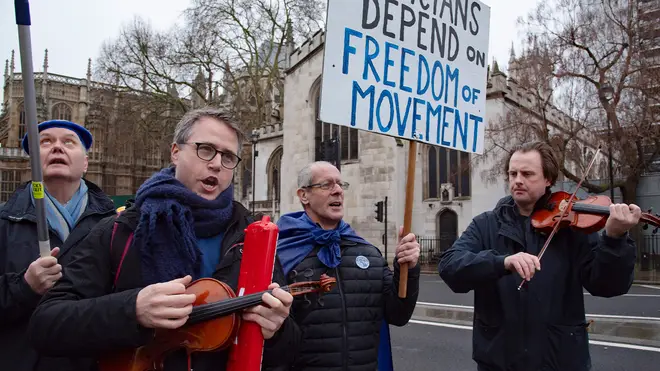Post-Brexit touring ‘prohibitively expensive’ for musicians if government fails to act, says Lords report
24 March 2021, 00:01

A new Lords report into the post-Brexit trade deal, which no longer allows UK musicians to work freely across the EU, insists “the nature of creativity” is about being able to collaborate internationally.
For months, UK musicians and creatives have been sounding the alarm about new barriers to EU touring. In some countries, such as Spain and Germany, they will have to apply for a work permit if they want to be paid for performances.
A new report into the post-Brexit trade deal, published today by the House of Lords EU Services Sub-Committee, insists “the nature of creativity” is about being able to travel and collaborate internationally.
Committee members say COVID-19 has stung the creative sector badly, and the government must resolve the issue of touring before international travel resumes.
A lack of mobility, members add, could make EU touring “prohibitively bureaucratic and expensive” for creatives.
Classical musicians have already spoken candidly of the reality of post-Brexit touring, citing £400 visas for single countries, and being replaced at gigs by colleagues with EU passports, due to an onslaught of paperwork now needed for British nationals.
The report quotes Horace Trubridge, general secretary of the Musicians’ Union, who explained: “If you are a musician, writing original music and performing live work just in the UK, it is difficult to generate enough income to sustain your business.”

Let Music Live protest on London's Parliament Square
Trubridge continues: “If you can go and play in France, Germany, Italy and Spain, play little festivals, do little tours, develop your fanbase, sell a bit of merchandise, increase the traffic to your website, increase the streams and downloads that you get, you start to get [...] an income that means that you can stay in the industry.”
Elsewhere, the report cites how the UK’s creative industries, which employ over two million people in the UK, were worth over £100 billion in 2019 and grew at twice the rate of the rest of the economy.
Financial incentives aside, committee members also emphasise the benefits of a thriving creative sector – from a “sense of pride, community and joy”, to promoting UK values and “soft power” abroad.
It is widely accepted that imposing limits on mobility will have huge implications for UK creatives; a survey by the Incorporated Society of Musicians found 43 percent of music sector workers travelled to the EU more than five times a year.
Deputy director for arts at the British Council, Cortina Butler, told the Committee that collaboration and ease of travel has been essential to the UK’s creative success: “That is the nature of creativity. It is about people connecting and collaborating,” Butler said.
Read more: British musicians ‘shamefully failed by government’ over lack of visa-free EU travel >

150 opera singers fight for the arts in Parliament protest
Over the course of 2020, committee members say they wrote several times to culture secretary Oliver Dowden, to raise concerns over the impact of restricting creatives’ mobility, and in particular their recovery from the COVID-19 pandemic.
The culture secretary has, on multiple occasions, expressed his disappointment at the outcome of the trade deal – particularly for musicians.
“We know just how vital the music business is to British life and we’re doing everything we can to support it through the worst crisis we’ve had in any of our lifetimes,” Dowden said in January.
The report adds that music contributes £5.8 billion to the UK economy annually and employs over 100,000 people. Plus, members add, some of the highest-grossing global tours of 2019 – with acts such as Sir Elton John and Ed Sheeran – have also been produced by the UK.
The comments on the creative sector came as part of a wider Lords report into post-Brexit trade in services between the UK and EU. Committee members concluded the government “must act to reduce barriers to UK-EU services trade”.
Both countries, the report adds, “still have work to do” in overcoming the significant challenges that remain for trade in services.


































